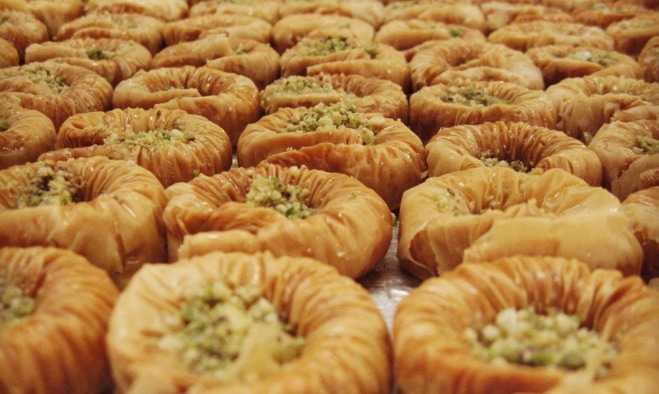
The dessert was a special treat consumed on its own and never taken for granted.
In Greece people would typically eat fruit after a meal. In the summer visiting my grandparents at the horio (village), I remember after every meal my grandma would bring out one or two fruits to the table, a knife and a plate. She would than sit with us, cut the fruit at the table placing them on the platter for all of us to eat.
When you go to a taverna here in Greece, the waiter will automatically bring a complimentary big platter of seasonal fruit at the end of the meal. Fruit is considered an important part of the meal like bread or wine, which may be another reason why Greeks have such a high intake of fruits and vegetables. I’ve started doing this with my older son; once we are done with lunch, I get up and grab a fruit and start cutting it and sharing it with him, and guess what? He eats it all!
Desserts and the Mediterranean Diet
I like the idea of not having to eat a dessert after a meal. Don’t get me wrong, I love desserts, all kinds: cakes, baklava type, cookies, but when I put pressure on myself to eat dessert after a meal: 1. I don’t really enjoy it because I’m already full from the food 2. I can’t really taste it because again, I have been eating the main meal, which usually consists of a lot of different flavors. 3. I feel pressured to eat it and then feel guilty for consuming even more calories that I’m not even enjoying.
I would rather be able to take the dessert home and eat it later or even the next day with some coffee or tea and really enjoy it, rather than making myself eat it after a huge meal and feeling physically as well as psychologically uncomfortable.
The next time you eat a dessert make it something special, eat it alone or with your favorite tea or coffee and really enjoy it.
Those Greeks were on to something…

What about loukoumi and halva? I read that loukoumi was originally made with honey, and they accompanied a cup of Greek/Turkish/Arabic coffee? Were these bites eaten frequently?
Hi Anthony, Yes, as I mentioned above, sometimes you would have a tiny sweet (a bite size sweet) with a coffee in the afternoon. Halva was more of a sweet consumed during fasting periods as it is vegan, but again in small amounts.
Love this article. I do the same thing with desserts, eat them the next day. A big part of what you teach is intuitive eating which to
me is even more important than your diet. Thanks for the great work you’re doing!
Thank you Brenda. Appreciate your comment. I believe older generations of all cultures were intuitively eating, we need to re-learn this.